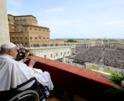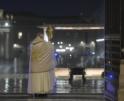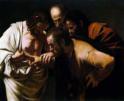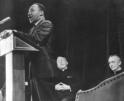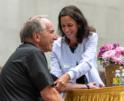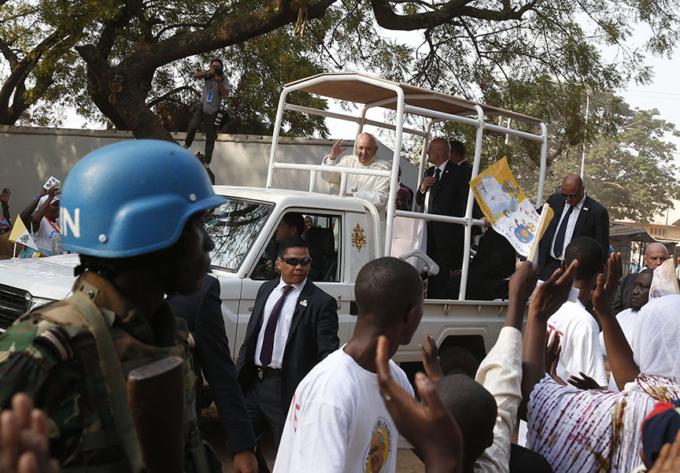
Culture
The pontiff would completely disregard his prepared remarks and start speaking in Spanish -- with the interpreter often struggling to keep up -- particularly when he lapsed into Argentinian patois.
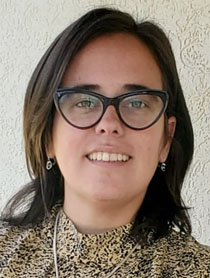
Martin
BUENOS AIRES (OSV News) -- It is often said that we are our truest selves when we are happy, comfortable and surrounded by those we love and trust. During each of the nearly 30 trips I made with Pope Francis, there was always a memorable moment when his true self would come out to play.
Early on, we would recognize this moment. The pontiff would completely disregard his prepared remarks and start speaking in Spanish -- with the interpreter often struggling to keep up -- particularly when he lapsed into Argentinian patois.
These days, more settled into his role of a globe-trotting pope and less prone to go off-script when speaking to thousands, you can still identify the moment where he forgets that he carries the earthly concerns of the Catholic Church on his shoulders, and he's back to being that young man who vowed to dedicate his life to Christ.
These moments never occur during the mandatory visits with politicians, nor during the necessarily solemn Masses.
The pope of the peripheries comes truly alive in the soccer stadiums surrounded by thousands of youth in South Korea, in a high-security prison in Mexico, or in a municipal dump-turned-city within a city in Antananarivo, capital of Madagascar. The joy Pope Francis felt when visiting fellow Argentine, Father Pedro Opeka, missionary and founder of Akamasoa, the humanitarian association that serves the people living in the garbage dump, is ingrained in the hearts and minds of many of the often-jaded reporters who get to travel aboard the papal plane.
Father Opeka turned a place where children would fight with dogs over discarded food into a city of friendship, with its own schools, universities, sports centers and a church that welcomes friends and foes of the faith every weekend. Sunday Mass in Akamasoa has become a must to anyone visiting.
From the start of his pontificate, the first pope from the global South has been denouncing the piecemeal consumption and exploitation of the third world by the West. Coming from the Southern hemisphere, the pope is particularly aware of this reality and has used his papal platform to give voice to the voiceless who are oppressed by poverty, exploitation, corrupt leadership and war.
We saw it earlier this year, when he fulfilled what he called a "dream" visit to the Democratic Republic of Congo and South Sudan, two countries in Africa affected by war, external exploitation and hunger.
From the smallness of these countries -- small in the international scene, that is -- Pope Francis called on the world to see not only their plights, sufferings and marginality, but also the many gifts and resources both nations have. As he said of Congo, it is a "land rich in resources and bloodied by a war that never ends."
When he is on the road, Pope Francis chooses to speak to the world from places that truly need a papal spotlight -- not only to highlight the suffering experienced there, but also to highlight the many gifts they could share with the rest of humanity, but with justice. From the Central African Republic to Bangladesh, from Thailand to Paraguay, from Iraq to Kazakhstan, Pope Francis models what he preaches -- he is a true pope of the peripheries.
Even when visiting the world's superpowers, Pope Francis brought the marginalized to the fore. The historic visit to Cuba on his way to the United States in 2015 wasn't a pat on the back to the Communist regime. He made a trek, seemingly impossible at the time, to insist on the need to maintain open spaces for diplomatic actions. With reflection and dialogue he wanted to prevent -- and in this case try to resolve -- problems.
When he went to France in 2014, Pope Francis delivered a somber diagnosis in the European parliament in Strasbourg: Europe, he declared, had lost its way, its energies sapped by economic crisis and a remote, technocratic bureaucracy. The continent was only a bystander in a world that had become less Eurocentric. He said the rest of the world often looks at the continent as an old, barren lady: "In many quarters we encounter a general impression of weariness and aging, of a Europe which is now a "grandmother," no longer fertile and vibrant," the pontiff stressed.
The humbler the people he encountered, it seems, the more prone Francis is to praise and champion them. This is not, of course, a pope who promotes poverty, but a man who has encountered in the humble ones of this earth, the clear representation of what he means when he calls for a "poor church for the poor," one that gets out of the sacristy to find people where they are -- an "Iglesia en salida" (or a "church that goes out").
For many, understanding what he means by this has been a challenge. There are those who think he wants a Marxist, populist or Peronist church, in reference to Argentina's Justicialista party, founded by General Juan Domingo Peron and immortalized in an artistic, if historically inaccurate, way by Andrew Lloyd Webber's "Evita." Others believe he wants to reform the church so it focuses solely on the excluded because they live in situations the church teaches are irregular -- the divorced and civilly remarried couples; those cohabitating; the LGBT community, and so on. But at the end of the day, people who know the pope best -- those who knew him when he was just Father Jorge Mario Bergoglio -- understand that the idea of a "poor church for the poor" is a literal one, not a metaphor.
Argentine theologian Juan Carlos Scannone says a key part of what shapes Francis's thought is a strongly Argentinian stream of Catholic thinking called "theology of the people."
It holds, Scannone told me years ago, that reflection on virtually any topic shouldn't start with ideological categories, but with the concrete experiences of ordinary people.
Friends say Bergoglio's identity was forged by Buenos Aires' popular religiosity, some of which goes back to the colonial era that brought devotions such as Our Lady of Lujan, patroness of Argentina. A second influence is that of immigrants who would wait in line for hours to venerate the image of St. Cajetan, patron of bread and work.
These expressions of popular piety have kept millions flocking to shrines as an expression of the people's faith. Francis learned to value such expressions of devotion early on, seeing them not merely as quaint or kitschy, but rather as a touchstone for both theology and pastoral activity.
Theological treatises have been written about Pope Francis and this popular religiosity. Another element ingrained in this theology of the people, often ignored, can help us understand his constant reaching out to the humble ones of this earth: it stems not only from the Gospel but from his firsthand experience of the incredible generosity often displayed by those who have less. Mistake me not: I am not romanticizing poverty when I say that in those slums of Buenos Aires neighbors know one another by name, help one another when there is nothing to eat, support one another and defend one another from the constant looming threat of substance abuse. In other words, those who have nothing are willing to give everything.
Francis saw this firsthand when walking these slums, and he projects this as the reality on the ground in the peripheries he visits when traveling abroad -- most of them lands of mission forsaken by everyone but God.
The pope of the peripheries shines a light on those who have less not only because he thinks the world can help, but because he knows that that the comfortable-but-spiritually impoverished have much to learn from them, including the role of generosity, if we are to build a lasting peace.
- Ines San Martin is vice president of communications for the Pontifical Mission Societies USA.
Recent articles in the Culture & Events section
-
The call of Pope Francis' final Easter messageMichael Reardon
-
The best of Francis: Five unforgettable momentsElizabeth Scalia
-
Scripture Reflection for April 27, 2025, Sunday of Divine MercyDeacon Greg Kandra
-
Dr. King's visit to Boston and St. John's Seminary 60 years agoViolet Hurst
-
The honor of caring for our priestsKate Marshall

